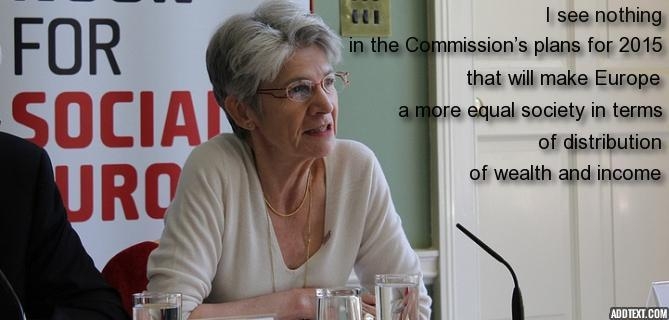
Editorial published in the Neues Deutschland by ETUC General Secretary : http://www.neues-deutschland.de/artikel/958450.endlich-mehr-fairness-in-europa.html on 15 January 2015.
Europe – The political cost of the crisis
Europe’s economy has been a mess since the crisis caused by greedy and reckless financial corporates ‘empowered’ by deregulation.
The economic policy ‘solutions’ to the crisis – austerity and cuts - have made things worse rather than better and have resulted in unacceptable unemployment, more inequality and less social fairness.
That there is a problem of social fairness is widely acknowledged by most people from European Commission President Jean-Claude Juncker to the Pope, and via IMF boss Christine Lagarde.
Strikes and protests against austerity policies are spreading. There were general strikes in Italy, Belgium and Greece at the end of the year and major protests in Spain and elsewhere.
The big question in 2015 is to what extent European elites will pay the political cost for making workers carry the costs of the crisis, and how much they are willing to change their failed pro-rich policies.
In January Greece goes to the polls, with a real possibility of victory for radical left party Syriza. In Spain, with elections at the end of the year, Podemos looks likely to become a major power. France has no national elections but regional polls in March could bring further gains for the Front National. UK elections in May are widely seen as the most open for decades with the Conservative Party very unlikely to gain outright victory and a number of smaller parties possibly holding the balance of power. In Germany anti-Muslim demonstrations show how even the most successful and wealthy countries have become dangerously divided. The future of the Euro is in the balance, as is Greek and British membership of the Eurozone and EU respectively.
It is impossible to write about the current political situation without mentioning the 17 people murdered during and after the attack on Charlie Hebdo, including of course the police and those killed in the Jewish supermarket. This was an appalling attack on freedom of speech and on respect for citizens. Action is needed at European level not only against terrorism but also for peaceful coexistence. To put the blame for this attack on one faith or one community would be exactly the wrong response. Citizens of all backgrounds must stand together against violence and discrimination.
In the face of these potential political earthquakes, how will our political leaders react? The political messages we are getting at the ETUC are mixed. On the one hand the EU seems set to adopt a limited, but nonetheless welcome, investment package to boost growth and jobs. I have my doubts about its likely impact but there is still time for the size of the fund to be increased.
On the other hand, the EU is still repeating the old mantra of ‘structural reforms’ (Government-speak for liberalisation and encouraging precarious employment), ‘fiscal consolidation’ (Government-speak for Government spending cuts and job losses), and ‘better regulation’ (Government-speak for getting rid of worker, consumer and environmental protections to boost corporate profits at the expense of society).
What worries me is the gulf between what the EU says it wants to do and what it actually does, and I am beginning to doubt whether the new European Commission’s ‘New Start for Europe’ is any such thing. I despair when I see the European Commission calling for ‘growth friendly fiscal consolidation’ as if we are stupid enough to believe that cuts can stimulate growth!
As far as I can see the agenda is still being set by corporate interests. The recent European Commission work programme dropped pending legislation, under pressure from Business Europe. Claims that they will be replaced by more ambitious or more ‘modern’ proposals remain to be realised. Despite widespread public opposition to giving companies privileged legal procedures to dispute Government decisions through the proposed EU-US trade deal, the European Commission gives the impression of wanting to tough it out on behalf of big business.
Much has been made of the need for more ‘fairness’ but I see nothing in the Commission’s plans for 2015 that will make Europe a more equal society in terms of distribution of wealth and income, or in terms of access to services and opportunities. Indeed so-called ‘structural reforms’ and ‘fiscal consolidation’ have a track-record of doing exactly the opposite. The response to the Lux Leaks scandal is yet to be seen, and a financial transaction tax is being weakened and delayed.
If our political elites think they can muddle through business-more-or-less-as-usual, too scared not to do what big business tells them, they are quite wrong. The people are angry. They will not be fooled by nice words, they expect actions and results in tackling the problems facing Europe – too many unemployed, too much inequality, too much social unfairness.
Unless EU leaders succeed in tackling these issues people will turn in increasing numbers to other parties and other institutions….
